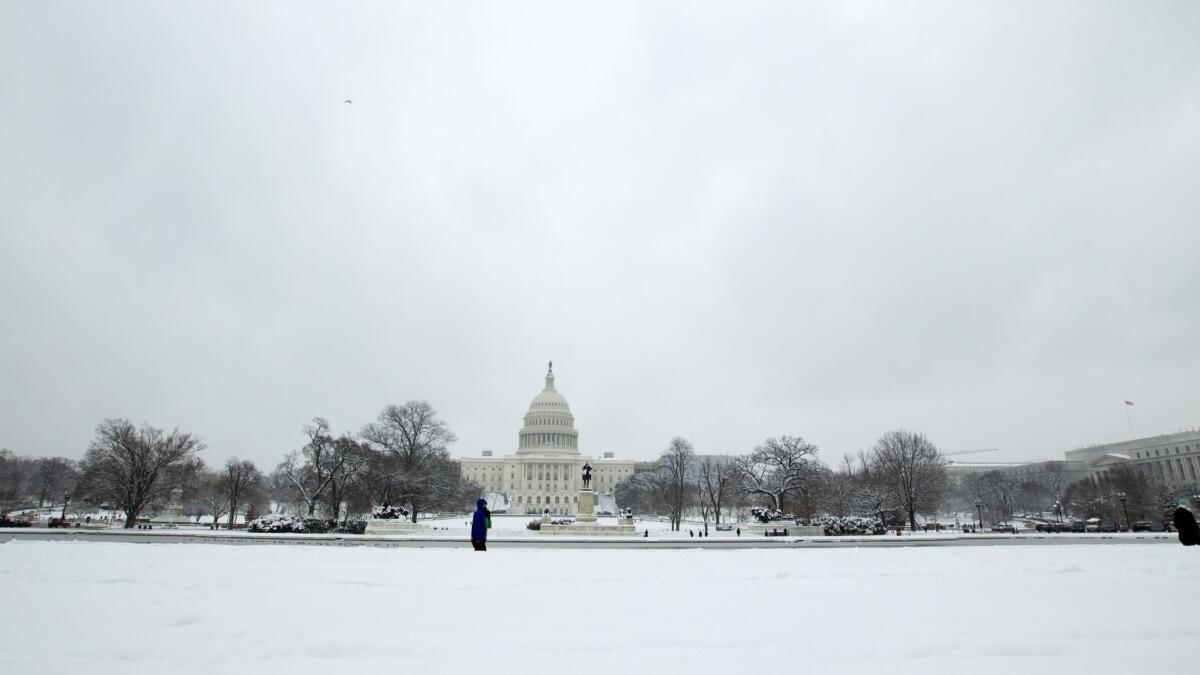Op-Ed: Keep religious tests out of the Senate

Brian Buescher is an Omaha attorney whom President Trump has nominated to sit on the U.S. District Court in Nebraska.
Like nearly 2 million other people, Buescher belongs to the Knights of Columbus — the world’s largest Catholic fraternal organization and a charity that focuses on fighting poverty.
John F. Kennedy, our first Catholic president, also belonged to the Knights of Columbus. Yet to read the questions Sen. Mazie Hirono of Hawaii and Sen. Kamala Harris of California asked Buescher as part of his confirmation process, his ties to the group could make him unfit to serve as a judge.
“The Knights of Columbus has taken a number of extreme positions,” Hirono stated in written questions, citing the group’s contributions to California’s Proposition 8 campaign to legally define marriage as between one man and one woman. “If confirmed, do you intend to end your membership with this group to avoid any appearance of bias?” Hirono’s next question: “Will you recuse yourself from all cases in which the Knights of Columbus has taken a position?”
There is a long history of judicial nominees being treated with suspicion because of their religion. It needs to stay in the past.
Harris asked equally pointed questions: “Were you aware that the Knights of Columbus opposed a woman’s right to choose when you joined the organization?”
It is reasonable for senators to ask nominees legal questions about hot-button topics, provided the questioners understand that nominees can give “no hints, no forecasts, no previews” about how they would vote in future cases, to use the phrase Justice Ruth Bader Ginsburg provided in her confirmation hearings.
But that is not what Sens. Hirono and Harris did. Rather, they appear to have leapt to the conclusion that because Buescher is affiliated with a certain religious organization, he is incapable of being impartial. That is a religious test.
The line of questioning Buescher faced about his affiliation with the Knights of Columbus sets a troubling precedent of intolerance — one that is unconscionable in principle and terrible in practice for people of all faiths who seek a role in public service.
It’s especially damaging for religious minorities. For centuries, many Jews have suffered a similar “dual loyalty” smear: the anti-Semitic lie that, faced with a choice between country and religion, a Jewish public official will put his faith before his country.
Should this logic become an accepted premise, it’s possible that any nominee who believes in a higher power — as nine in 10 Americans reportedly do, according to the Pew Research Center — could see his or her affiliations and beliefs scrutinized.
Because the views of religious minorities are less understood, nominees of such faiths could be asked to defend their affiliations to a much greater degree. As a rabbi, this concerns me greatly.
This practice has no place in America. Article VI of the Constitution guarantees that “no religious test shall ever be required as a qualification to any office or public trust under the United States.”
This set America apart from Britain, which banned Jews from serving in Parliament until well into the 19th century. Across the new country, Jews were able to hold government offices in ways that had been impossible in the Old World. This tradition should not be sacrificed simply because a couple of senators want to score political points.
It’s a shame that a Catholic nominee should face this kind of hostile questioning during his confirmation process. In previous decades, adversarial hearings were used in attempts to keep Jews out of the judiciary.
Indeed, the very first public Supreme Court nomination process, held in 1916, was an anti-Semitic spectacle in which various figures attempted to smear the high court’s first Jewish nominee, Louis Brandeis.
A Boston politician called Brandeis “a slimy fellow” capable of using “his smoothness and intrigue, together with his Jewish instinct,” to attain power. Ex-president and future Chief Justice William Howard Taft called Brandeis “utterly unscrupulous” and “a man of infinite cunning,” warning that he “has adopted Zionism, favors the new Jerusalem, and has metaphorically been re-circumcised.”
Enter the Fray: First takes on the news of the minute »
The next Jewish nominee to the Supreme Court, Benjamin Cardozo, faced resistance as well. Justice James McReynolds — who had refused to sit next to Brandeis in official court photographs — opposed Cardozo’s nomination on blatantly anti-Semitic grounds. At Cordozo’s swearing in, in 1932, McReynolds read a newspaper during the proceedings and could be heard muttering, “Another one.”
There is a long history of judicial nominees being treated with suspicion because of their religion. It needs to stay in the past.
It would be absurd enough to interrogate a political candidate about whether she intended to impose her personal religious beliefs on the country through legislation. It is even more absurd for senators to imply that a judge, who cannot propose or enact legislation, would be incapable of setting aside his religious beliefs when interpreting our written laws.
If sitting lawmakers are allowed to make such assumptions of Catholic nominees, religious minorities could very well be next.
Sens. Hirono and Harris ought to consider the words of Haym Solomon, the Jewish immigrant and Revolutionary War hero: “I am a Jew; it is my own nation; I do not despair that we shall obtain every other privilege that we aspire to enjoy along with our fellow-citizens.”
Rabbi Mitchell Rocklin is a research associate at Princeton University, a reservist military chaplain and the president of the Jewish Coalition for Religious Liberty.
Follow the Opinion section on Twitter @latimesopinion or Facebook
More to Read
A cure for the common opinion
Get thought-provoking perspectives with our weekly newsletter.
You may occasionally receive promotional content from the Los Angeles Times.










